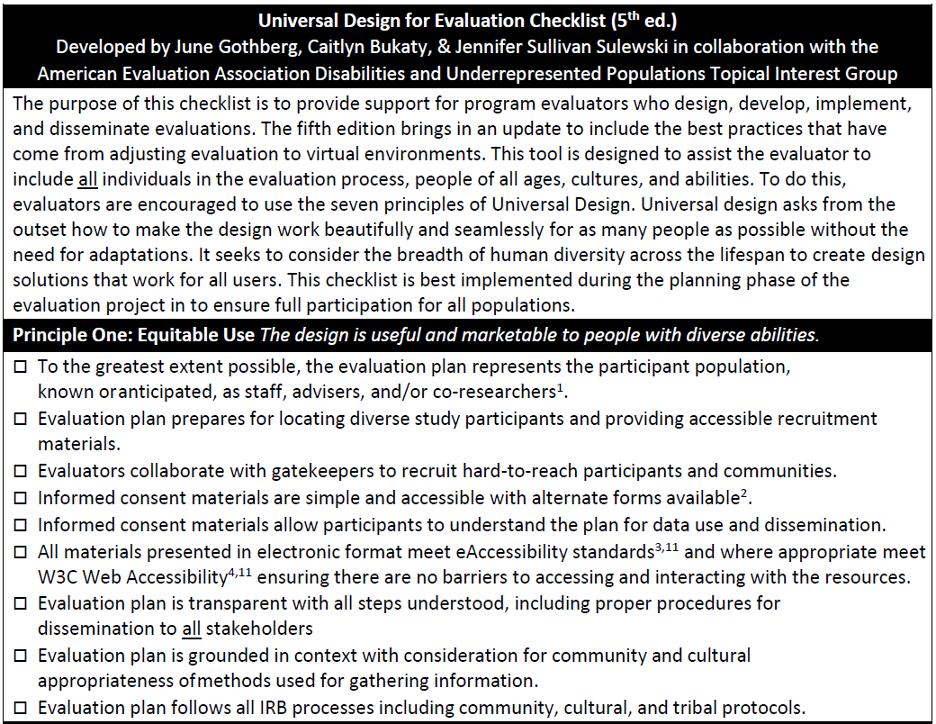Welcome to a week focused on Inclusive Evaluation Design hosted by the Disabilities and Underrepresented Populations Topical Interest Group (TIG). We are June Gothberg and Caitlyn Bukaty, the chairs of the TIG. Our TIG is made up of evaluators who are passionate about increasing the inclusion of all people in program evaluation including diverse populations such as persons with disability, migrants, elderly, adjudicated, wounded warriors, persons who experience trauma, abuse, human trafficking, homelessness, poverty, health concerns, limited literacy or language, children in foster care, etc. Below is a word cloud of the topics covered in our conference sessions:

What is Inclusive Evaluation Design? – inclusive evaluations “are purposefully planned to ensure that all participants have the opportunity and supports needed to fully participate and have their voices heard” (Gothberg, FLPEPPI, 2021).
During the last three years at AEA we have hosted annual Think Tanks to gather insights on lessons learned, tips, and resources for designing inclusive evaluations. This week of AEA365 is dedicated to sharing the insights gathered from the DUP TIG Think Tanks. Because our work in the DUP TIG centers around the inclusive practices of universal design (UD), we will use the Universal Design for Evaluation (UDE) framework to disseminate our collective knowledge.
A couple of terms we should define:
- Inclusive Evaluation includes the use of inclusive practices during the design, implementation, analysis, and dissemination of evaluations.
- Universal Design (UD) is the design of products and environments to be usable by all people, to the greatest extent possible, without the need for adaptation or specialized design.

“When you include the extremes of everybody, that’s to say differently abled people of all sorts, then you produce things that are better for all of us” ~ Michael Wolff
There are seven principles to UD which we will report on this week, one each day.
- Equitable use
- Flexibility in use
- Simple and intuitive use
- Perceptible information
- Tolerance for error
- Low physical effort
- Size and space for approach and use
Today we focus on Principle 1 – Equitable Use.
Hot Tips
Equitable use means the design should be useful to people with diverse abilities and
- provide the same means of use for all users: identical whenever possible; equivalent when not.
- avoid segregating or stigmatizing any users.
- Include provisions for privacy, security, and safety are equally available to all users.
- be appealing to all users.
Lessons Learned
- If you do not plan for equitable use during the planning stages for designing evaluations, you probably won’t achieve it.
- You should include a broad group of stakeholders in the planning stage with representation from the participant groups for which you will be including.
- You should question whether your data is representative of the entire participant population served.
- When you are analyzing and reporting your data, you increase reliability, validity, or credibility when you disaggregate your data using relevant demographics such as race, ethnicity, gender, age, socioeconomic status, health, ability, neurodiversity, language and literacy, geography, and contextual markers important to your participant group.
Rad Resource
Universal Design for Evaluation Checklist (5th Ed) Introduction and Principle 1 Equitable Use – this research-based checklist was developed specifically for evaluators by the DUP TIG at AEA to assist evaluators in designing inclusive evaluations.
The American Evaluation Association is hosting the Disabilities & Underrepresented Populations TIG (DUP) Week. The contributions all week come from DUP members. Do you have questions, concerns, kudos, or content to extend this AEA365 contribution? Please add them in the comments section for this post on the AEA365 webpage so that we may enrich our community of practice. Would you like to submit an AEA365 Tip? Please send a note of interest to AEA365@eval.org . AEA365 is sponsored by the American Evaluation Association and provides a Tip-a-Day by and for evaluators. The views and opinions expressed on the AEA365 blog are solely those of the original authors and other contributors. These views and opinions do not necessarily represent those of the American Evaluation Association, and/or any/all contributors to this site.

